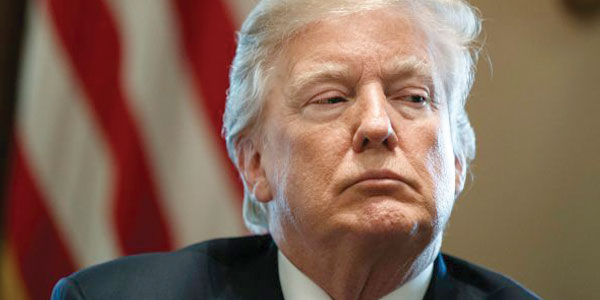
Attention editors: The second paragraph in this article contains language that may be offensive to some readers.; Art Note: A photo of Jorge Ramos accompanies this article.
President Donald Trump’s most recent racist remarks don’t surprise me. What does surprise me, however, is the fact that it took this long for so many people to accept the fact that the president subscribes to racist ideas.
Racism — the belief that one race or ethnic group is superior to another — was evident at a recent White House meeting between Trump and lawmakers about extending protections to migrants from Haiti and some African countries. “Why are we having all these people from shithole countries come here?” Trump asked, according to reporting by The Washington Post.
That’s not all. “Why do we need more Haitians?” Trump asked, and suggested instead that having immigrants from Norway would be preferable, according to the Post. Trump’s view, clearly expressed, favors white European immigrants over people of African descent. This is precisely the definition of racism.
The day after he reportedly made those remarks, Trump took to Twitter to deny he said such things. But he has no credibility left. The Post has a running list of Trump’s lies or falsehoods; earlier this month it had climbed to 1,950 in his first 347 days in office. Now there’s one more to add.
Sen. Dick Durbin, a Democrat from Illinois who attended the meeting, confirmed what Trump had said. “I cannot believe that in the history of the White House, in that Oval Office, any person has ever spoken the words that I personally heard our president speak yesterday,” Durbin told reporters. “He said these hate-filled things, and he said them repeatedly.”
Of course, this is not the first time that Trump has spouted racist remarks. He kicked off his presidential campaign in June 2015 by likening Mexican immigrants to rapists and drug smugglers. At the time, a great number of journalists from the Spanish-speaking press in both the United States and Latin America denounced these comments, but many thought we were just being too sensitive to a candidate’s rudeness. One negative remark, the thinking went, was not enough to brand a politician as a racist.
Today we know we were right. Trump’s remarks in 2015 were as racist as those he just made in 2018. It used to be that such comments would disqualify any candidate for the presidency. Not anymore.
But with Trump, this has been going on for a long time. Let’s not forget that for years he expressed doubt that Barack Obama, the country’s first African-American president, was born in the U.S. Let’s also not forget that he also publicly questioned the work of Judge Gonzalo Curiel, on the grounds that his parents were born in Mexico, and that he proposed banning Muslims from coming to the U.S. These efforts were all laden with stereotypes and racial prejudices.
Yet, despite his racist remarks, some 63 million Americans voted for Trump. That is worrisome, since hearing the president make such remarks in the White House might open the doors for his supporters to do the same thing.
Further, his behavior sets a bad example for kids. Imagine the risk and the bullying that Haitian and African children attending American schools could be exposed to. Lately, news outlets have had to caution parents about letting their children hear what the president has just said. And social media is filled with insults and threats toward immigrants from all over the world.
Sadly, Trump has the ability to bring out the worst in us. His words have always fostered polarization. It’s unfortunate that his comments didn’t disqualify him from being president years ago.
Is Trump a racist? I cannot tell what’s inside his head, but I do know what comes out of his mouth. And that is taking us to a very dark place.
(Jorge Ramos, an Emmy Award-winning journalist, is a news anchor on Univision.)
______________________________________________________________________________________________
Trump y Sus ‘Países de Mierda’
El último comentario racista del presidente Donald Trump no me sorprende. Pero lo que sí me sorprende es que tanta gente se haya tardado tanto tiempo en entender que el ocupante de la Casa Blanca tiene ideas racistas.
El racismo es creer que una raza o grupo étnico es superior a otro. Y eso es exactamente lo que dijo Trump en la Casa Blanca el jueves pasado en una reunión con seis congresistas. “¿Por qué tenemos aquí a tanta gente de países de mierda?” dijo Trump, según el reporte original del diario The Washington Post.
El presidente y los congresistas discutían una propuesta para dar visas o protección migratoria a inmigrantes de Haiti y de África.
Eso no es todo. Luego dijo: “¿Por qué queremos tener aquí a gente de Haiti?” y sugirió, en cambio, que sería mejor traer a gente de Noruega. Esto es suficiente para entender los prejuicios del presidente de los Estados Unidos. Su visión, claramente expresada en la Oficina Oval, favorece a los inmigrantes blancos europeos frente a los descendientes de África.
Esa es precisamente la definición de racismo.
Al día siguiente de hacer estos comentarios, Trump en Twitter negó haberlos dicho. Pero el Presidente ha perdido mucha credibilidad. El Washington Post tiene una lista de las 1,950 mentiras o falsedades que ha dicho en sus primeros 347 días en la Casa Blanca. Y ahora hay que sumar otra mentira más.
En esa reunión con el Presidente había, al menos, otras seis personas. El senador Demócrata, Dick Durbin, quien estuvo presente, confirmó a la prensa lo que dijo Trump. “En la historia de la Casa Blanca y de la Oficina Oval, ningún presidente había dicho las palabras que yo escuché ayer,” aseguró Durbin. “Dijo cosas llenas de odio y las dijo repetidamente.”
Pero esta no es la primera vez en que Trump hace comentarios racistas. Su campaña electoral comenzó en junio del 2015 con un brutal comentario racista. Trump dijo que los inmigrantes mexicanos eran “violadores”, criminales y narcotraficantes. Muchos de nosotros, en la prensa Hispana de Estados Unidos y en América Latina, denunciamos los comentarios de Trump. Pero mucha gente no nos quiso hacer caso. Creían que éramos demasiado sensibles a las groseras declaraciones de un candidato presidencial, y que no era suficiente un solo comentario negativo para acusar a un político de racismo.
Hoy sabemos que sí teníamos razón. Los comentarios de Trump en el verano del 2015 fueron tan racistas como los que acaba de hacer en 2018. Esas expresiones llenas de racismo, antes de Trump, hubieran descalificado a cualquier candidato presidencial. Pero entonces no nos pusieron suficiente atención, y hoy es demasiado tarde porque Trump ya es Presidente.
Eso no es todo. Hay más ejemplos de racismo. Trump durante años cuestionó que Barack Obama, el primer presidente afroamericano en la historia, hubiera nacido en Estados Unidos. También dudó públicamente del trabajo que estaba haciendo el juez, Gonzalo Curiel, sólo porque sus padres nacieron en México. Y durante la campaña electoral propuso que no se le permitiera entrar a los musulmanes al país. Son, todas, expresiones cargadas de prejuicios raciales y estereotipos.
A pesar de los varios comentarios racistas de Trump, 63 millones de estadounidenses votaron por él. Y eso es muy preocupante. Si el propio Presidente, desde la Casa Blanca, se expresa con términos racistas, eso abre la puerta a que algunos de sus votantes hagan lo mismo.
Su comportamiento es un mal ejemplo para cualquier niño. ¿Se imaginan el riesgo y el bullyingal que se exponen niños haitianos y africanos que van a escuelas estadounidenses? En noticieros de todo el país hubo la siguiente advertencia: No dejen que sus hijos escuchen lo que dijo el Presidente. Y las redes sociales, tristemente, están repletas de insultos y amenazas contra inmigrantes de todas partes del mundo.
Trump tiene la habilidad de sacar lo peor de nosotros.
Las palabras de Trump siempre promovieron la división. Pero lo más triste es no haberlo descalificado a tiempo. ¿Es Trump un racista? Yo no sé lo que hay dentro de su cabeza pero sí sé lo que sale de su boca. Y nos está llevando a un lugar muy oscuro en la historia moderna de Estados Unidos.
(Jorge Ramos, periodista ganador del Emmy, es el principal director de noticias de Univision Network. Ramos, nacido en México, es autor de nueve libros de grandes ventas, el más reciente de los cuales es “A Country for All: An Immigrant Manifesto”.)









